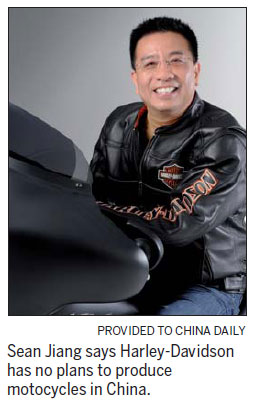A ride high on the hog
Updated: 2013-04-19 08:46
By Wang Chao (China Daily)
|
|||||||||

An American icon has gained a loyal following in China
Harley-Davidson just sits back and enjoys the ride. It has done that in China for the past seven years as Chinese motorcycle companies go full throttle trying to hawk their wares using primetime TV and other advertising channels.
The US company is such a marquee name that in China it saves itself that huge expense, and in TV advertising and on highway billboards it is nowhere to be seen.
Likewise, the company's sales and revenue figures for China are absent, the company keeping them confidential, although it says the number of motorcycles sold has doubled every year since 2006.
The company entered China the previous year, at the grand age of 102. Before that its motorcycles found their way into the country through illicit channels, making it difficult to know how many there are.
On entering the country, Harley-Davidson set up a subsidiary, the only Western motorcycle company to do so; others have signed up with agencies or dealerships.
But well before the smuggling years, Harley-Davidson had a connection with China, a store in Shanghai having sold its motorcycles from the 1920s. During World War II US President Franklin Roosevelt approved the donation of 1,000 Harley-Davidsons to China for military purposes.
Last year the Chinese subsidiary launched a campaign called "In Search of the Earliest Harleys", and a collector showed a model that dates back to the 1940s.
Sean Jiang, president of Harley-Davidson China, says the only way to get an idea of how many of its motorcycles are in China is through the owners' association. A buyer automatically becomes a member of the Harley-Davidson Owners Group, and since 2006 more than 2,000 people have joined. Twenty-four models are sold in China.
HOG chapters organize many kinds of activities, the company says. The most frequent are group rides across the country, and even the world. Dealers also organize similar rides on weekends, or they bring groups to ride overseas with rented motorcycles from local dealers. HOGs and dealers, as well as Harley-Davidson China, provide safety training for the riders.
To celebrate the brand's 110th anniversary this year, the Chinese subsidiary has invited 30 owners from the US to ride in Zhejiang province next month. The Chinese company will take care of licensing, insurance and motorcycle rentals.
The brand had 11 dealers in China by the end of last year and plans to add two this year. The dealerships are not necessarily in first-tier cites, Jiang says, and the main consideration is whether the city has a motorcycle riding culture.
"Take Chongqing, for example. It has a dozen motorcycle makers and the government has good policies for motorcycles, so we set up dealerships there as early as last year."
Local purchasing power is another thing to be considered, Jiang says, as Harley-Davidsons do not come cheap. A Super Glide Custom 110th Anniversary limited edition in the Dyna Family costs more than 200,000 yuan ($32,360; 24,800 euros).
"We look at luxury car sales in the city to decide whether to set up a dealership there, as our customers tend to be in the same group."
The existing 11 dealerships are in Beijing, Shanghai, Chongqing, Suzhou, Dalian and other cities. Beijing and Shanghai have the largest Harley-Davidson colonies.
Zhang Tao, a Beijing-born businessman who has a shop that sells traditional Chinese paintings and decorations, is secretary-general of HOG's Beijing chapter.
"Harley-Davidson riders come from all kinds of professions, including lawyers, teachers and civil servants," he says.
But they have one thing in common: they are rich enough to pay 200,000-plus yuan on a motorcycle they ride only once in a while; the best Japanese motorcycle costs about half that.
For 10 years Zhang has stuck to two wheels, moving from a Yamaha 250 to a Honda 400 and then a Harley-Davidson Super Glide Custom.
"Harley-Davidson owners are mostly males between 35 and 50, senior managers or businessmen," Jiang says.
"Compared with other heavyweight motorcycles, Harley-Davidson owners are older as the brand is best-known for low-speed rides."
Industry insiders estimate that more than half the profit in the only Beijing store comes from accessories such as badges, scarves, and other gear bearing Harley-Davidson logos.
Often Western vehicle manufacturers wish to localize their production in China so they can avoid tariffs and bring down prices and gain bigger market share, but Harley-Davidson says it has no plans to produce its motorcycles in China.
It has taken 50 to 60 percent of the country's heavyweight motorcycle market, and ranks No 1 in the high-end market.
But the brand faces an unusual problem in China: restrictions on motorcycles. Jiang says those restrictions seriously curb the development of high-end brands such as Harley-Davidson.
"In the US, motorcycles enjoy the same treatment as cars, but in China, 200 out of the 2,000 cities restrict the use of motorcycles."
wangchao@chinadaily.com.cn
(China Daily 04/19/2013 page11)

 Li Na on Time cover, makes influential 100 list
Li Na on Time cover, makes influential 100 list
 FBI releases photos of 2 Boston bombings suspects
FBI releases photos of 2 Boston bombings suspects
 World's wackiest hairstyles
World's wackiest hairstyles
 Sandstorms strike Northwest China
Sandstorms strike Northwest China
 Never-seen photos of Madonna on display
Never-seen photos of Madonna on display
 H7N9 outbreak linked to waterfowl migration
H7N9 outbreak linked to waterfowl migration
 Dozens feared dead in Texas plant blast
Dozens feared dead in Texas plant blast
 Venezuelan court rules out manual votes counting
Venezuelan court rules out manual votes counting
Most Viewed
Editor's Picks

|

|

|

|

|

|
Today's Top News
Boston bombing suspect reported cornered on boat
7.0-magnitude quake hits Sichuan
Cross-talk artist helps to spread the word
'Green' awareness levels drop in Beijing
Palace Museum spruces up
First couple on Time's list of most influential
H7N9 flu transmission studied
Trading channels 'need to broaden'
US Weekly

|

|








